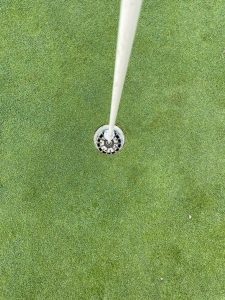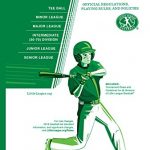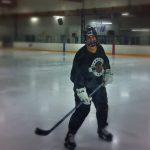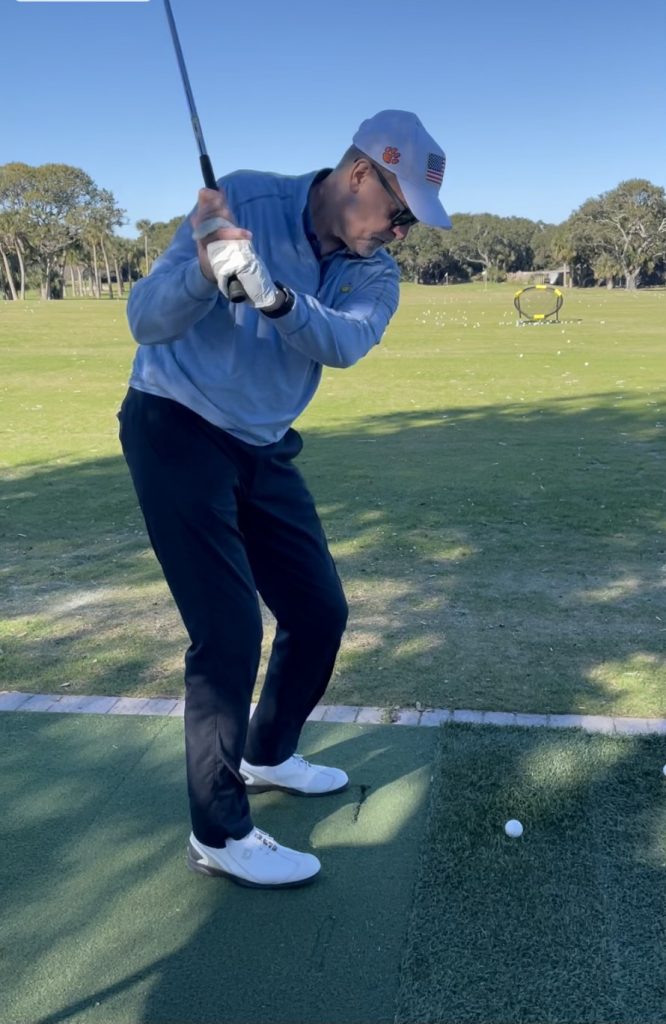
Rotator cuff surgery doesn’t deter golfer or ability to hit a hole-in-one
Three months and two weeks after shoulder surgery with Dr. Steven Chudik, Len Serwat hit a 130-yard
hole-in-one on #4 at Flagg Creek in Countryside, Illinois, during his first golf outing of the year. A hole-in-one for any golfer is an accomplishment, but for Serwat it was a total surprise. “Because I was still doing physical therapy for my shoulder surgery, I only was doing half swings and used a #7 iron off the tee,” Serwat explained. “It was a very slow and easy swing and it (the ball) just went,” he added.
Serwat, a self-proclaimed average golfer, learned to play the sport in the sixth grade during a family trip to West Virginia, but it wasn’t until college that he took an interest in playing and has been crafting his skills ever since despite a few surgery speed bumps along the way. The most recent bump according to Serwat was the re-injury of his right shoulder while shoveling snow. “I tore my rotator cuff about 16 years ago and needed surgery,” Serwat said. “Recovery went well and I bounced back quickly. Then, about three years ago, I hurt it while shoveling snow and went back to see the surgeon. A new MRI revealed minor tears but I decided I could live with the limited pain,” he explained.
According to Serwat, he lived with intermittent pain for two years until it was waking him up at night and he was unable to complete the weight lifting exercises he did routinely. “I’m pretty active so I was determined I wasn’t going to let this continue without getting it evaluated, but the surgeon I’d seen previously was retiring so he recommended I make an appointment with his partner, Dr. Steven Chudik, who is arthroscopic shoulder expert,” Serwat said.
Serwat’s clinical visit with Dr. Chudik and a subsequent MRI showed the tears previously identified had progressed to become a full thickness, retracted supraspinatus rotator cuff tear. “Dr. Chudik explained my options but told me my injuries were not going to heal and continue to gradually worsen over time as it had so far,” Serwat lamented. “I told him I had to think about it because I really didn’t want to go through another shoulder surgery,” he added.
Three days later, Serwat called Dr. Chudik’s office to schedule surgery. “I could tell it was getting worse and I wanted to get the surgery done so I could finish my physical therapy in time to golf during a trip to South Carolina,” Serwat explained.
“Just as experienced by Mr. Serwat, rotator cuff tears can progress over time and eventually become more symptomatic,” explained Dr. Chudik. “Early repair while the tear is smaller always results in better outcomes,” he added.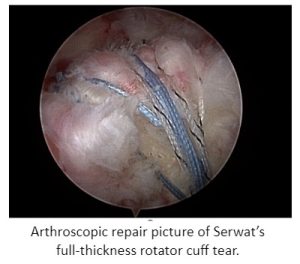
According to Dr. Chudik, repairing the rotator cuff is repairing rotator cuff muscle by its tendon back to the bone. Recovery following surgery typically requires six weeks of immobilization in a sling to allow initial healing followed by a gradual restoration of strength and motion. Complete recovery requires from four up to 12 months for older and larger tears. “You can’t speed up the healing and recovery but you can allow a gradual progression, even with activities like golf to keep patients positive and optimistic during their recovery,” Dr. Chudik explained.
Knowing the importance physical therapy played in his previous surgery, Serwat said he was diligent about keeping appointments and doing all the home exercises Dr. Chudik ordered. However, Serwat told Dr. Chudik he was frustrated with how slow it was to return to normal activities.
To Serwat’s delight he was told he could begin Dr. Chudik’s return to golf protocol which provides a safe, gradual progression that allows
golfers to putt after six weeks followed by light swings, short irons, etc., during recovery and as physical therapy progresses. “That was all I needed to hear,” Serwat said. “I headed to the driving range and continued my exercises there that also included easy, half-swings and not trying to hit for distance,” he explained. “It was all about slowing down and making the shots.” Serwat said he still has a way to go until his shoulder is completely recovered and his strength is back, but until then he’s delighted to be back on the course as part of Dr. Chudik’s prescribed program and even has a hole-in-one to prove slow and steady can win the game.
